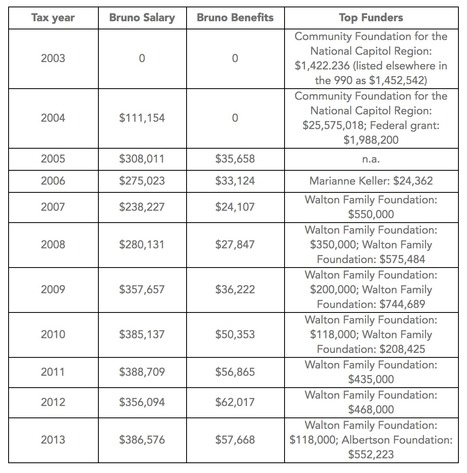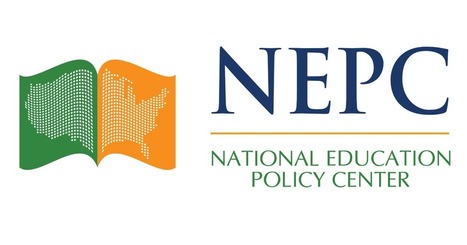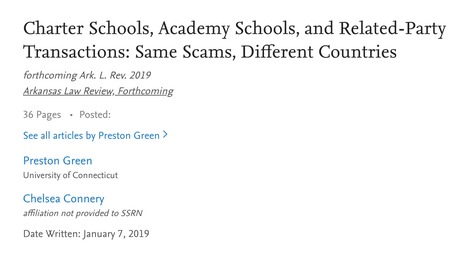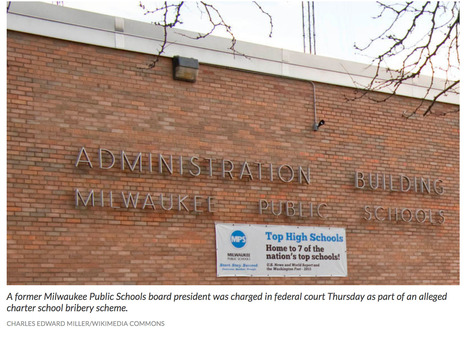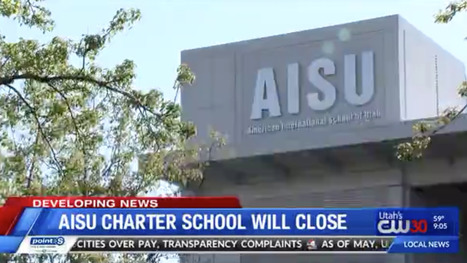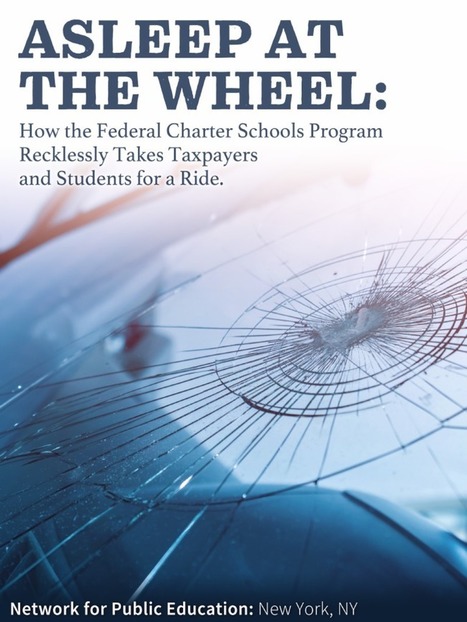 Your new post is loading...
 Your new post is loading...
The document above is the Executive Summary of a report that details the Network for Public Education’s two month examination of the U.S. Department of Education’s Charter Schools Program (CSP). ..."Our investigation found a troubling pattern of insufficient applicant review, contradictions between information provided by applicants and available public data, the gifting of funds to schools with inadequate financial and governance plans, a push-out of large grants to the states with little supervision by the department, and the waste of hundreds of millions of taxpayer dollars. By comparing claims made by charter grant applicants to information on state databases and school websites, we found numerous examples of federal tax dollars being misspent due to an inattentive process that routinely accepts applicants’ claims without scrutiny. We found that it is likely that as many as one third of all charter schools receiving CSP grants never opened, or opened and shut down. In fact, the failure rates for grant-awarded charter schools in California has reached nearly four in ten. American taxpayers have a right to demand that their tax dollars not be wasted. Tax dollars that flow to charter schools that never opened or quickly close should not be considered the cost of doing business. And a program with a stated commitment to spread “high-quality” schools should not be a major funding source for schools that leave families in the lurch and promote discriminatory enrollment practices that increase segregation and unequal opportunity for students with disabilities, behavioral challenges or English language learner status. We cannot afford to continue to pump hundreds of millions of dollars into a program whose stewards are clearly asleep at the wheel. To download the Executive Summary click on the title or arrow above. To download the full report, visit: http://bit.ly/NPE_charter_report
By Rick Cohen “Paradise in Potomac: Every inch of couple’s estate built for living lavishly,” read the Washington Post headline about the home of Joe Bruno and his wife, Cynthia Marini Bruno, in a society-page style article in the Post’s real estate section. For those of us who don’t often turn to the society or real estate columns lauding the lifestyles of the rich and perhaps-not-so-famous, the description of the Brunos’ abode is otherworldly: the gated entrance with wrought-iron gates tipped with gold, the stone fountain “reminiscent of Villa D’Este near Rome,” the “breathtaking” foyer with a two-story chandelier and an ivory and marble floor, the underground grotto with yet another stone foundation “accessible only from a hidden door in the media room,” high-end furnishings from all over Europe, and our favorite, a painting of Bruno as “The Godfather.” Why should anyone particularly care about the Brunos’ estate? Because the article described Bruno as a consultant to charter schools, specifically as the president of Building Hope, an organization that provides technical and financial assistance to public charter schools. “We’ve had some great parties in this house while our daughters were growing up and with our friends from the charter school world and from the Italian American groups we belong to,” the Ferrari-driving Bruno (he owns two) was quoted to say. “There’s a story behind every painting, every collection and every piece of furniture.” Few people expect the Brunos or others in the nonprofit sector to take a vow of poverty. Nonetheless, the notion of making big bucks from public education strikes some people as plain wrong—and charter schools are parts of public school systems, no matter how much they may be freed from school systems’ managerial and curriculum strictures. In public schools where teachers are frequently working their tails off to educate kids, and in charter schools where teachers often work longer hours but get paid 10 to 15 percent less than teachers in traditional public schools, the idea that charters have helped Bruno build and furnish his 20,000 sq. ft. estate with 11 fireplaces “and so many crystal chandeliers that the Brunos have lost count” seems to be a sore point, especially with families with children in public school districts. It may well be that Joe Bruno earned his wealth prior to becoming a consultant to the charter school world, or perhaps the money for the estate is Cynthia’s (the Brunos previously owned an antique store in Kensington, Maryland). Or maybe as savvy shoppers, the Brunos were able to “gather…the sculptures, sconces and swag for the dozens of rooms in the Bruno home” at IKEA-like bargain prices. Somehow, the fact that their game room “is furnished with a 16th-century liturgical cabinet from an Italian cathedral” convinced us that the Brunos spent money to accumulate material possessions. One of the consistent criticisms of the charter school movement is that nonprofit and for-profit management entities and consulting firms are making healthy incomes from charters. Examining for-profit education management organizations (EMOs), Amy Barat of the Roosevelt Institute raises questions about “public education funding…going to support both an additional school choice option for students in failing schools and the bottom-line of for-profit companies,” which she headlines as “education for profit; the darker side of charter schools.” Hofstra University’s Alan Singer has written extensively of the “big profits in not-for-profit charter schools.” AlterNet’s Kristin Rawls writes about the problem of people earning “big bucks” from managing and advising charter schools. On GuideStar’s excellent database, S. Joseph Bruno is identified as the president of Building Hope, a charter schools facilities fund, which seems to have begun with a grant of $1,422,236 from the Community Foundation for the National Capital Region, according to Building Hope’s first published 990 (a form 990PF because of its lack of a diversity of funders or contributors). The funding of Building Hope and the changes in Bruno’s compensation over the years look to be roughly as follows: [see image above]... For full post, please visit: https://nonprofitquarterly.org/joe-bruno-a-very-well-compensated-consultant-to-charter-schools/
BOULDER, CO (May 30, 2019) "The Center on Reinventing Public Education (CRPE), based at the University of Washington, Bothell, recently released a series of three policy briefs on the financial impact of charter schools on nearby school districts in California. The briefs are intended to inform ongoing debates over charter school financing and expansion in the state of California.
After reviewing all three, Professor Bruce D. Baker of Rutgers University found that they failed to accurately or fully apply the relevant research and data. The resulting briefs, while raising and attempting to address important issues, erroneously minimize the likely fiscal impacts of charter growth.
The first brief, Charter Schools and District Enrollment, attempts to minimize the import of the considerable role played by charters in districts’ enrollment loss, offering up the non sequitur that enrollment loss can arise from other sources as well. The brief’s assertion that charter enrollment growth bears little blame for district enrollment decline is not correct. It is, and has been for some time—whether in districts with declining, stable, or growing overall student enrollments.
The second brief, Do Charter Schools Cause Fiscal Distress in School Districts, contends that serious fiscal problems in school districts is most often caused by financial mismanagement and has no relationship with charter enrollment share. The brief relies on overly simplistic comparisons of charter enrollments and county-assigned “fiscal distress” classifications to conclude that there is no association between charter enrollments and fiscal distress. The contention here is that there can’t be an illness if the patient isn’t dead. In order to rely on this problematic approach, the brief erroneously dismisses a significant, more rigorous, detailed, peer-reviewed, and published body of research that illustrates the fiscal impact of charter schools on host districts, and how those fiscal impacts may lead to fiscal stress.
The third brief, Do the Costs of California Charter Schools Outweigh the Benefits, presents itself as an analysis of costs and benefits. But it merely touts the benefits of charter schooling as tangible while being entirely dismissive of numerous known and often measurable costs.
Taken together, the briefs are useful only in pointing to some important issues that policymakers should consider; their analyses of those issues are, however, generally superficial and misleading.
Find the review, by Bruce D. Baker, at: http://nepc.colorado.edu/thinktank/ca-charters"
By Jennifer Palmer "To save his financially imperiled school district, Panola Superintendent Brad Corcoran in 2017 pitched a plan to convert the traditional public district into a charter school.
In becoming a charter, Panola Public Schools would turn over its management to a company affiliated with Epic Charter Schools, the largest online school in the state. The school board agreed.
The Epic-related firm contributed $100,000 toward Panola’s debt as part of the agreement. That company manages the small district for a more than 10 percent cut of its funding. Panola’s high school students now have the option to attend most classes online from home.
The deal was unprecedented. Not only was it one of the first conversions-to-charter in the state, it allowed Epic’s company to operate a school and gain many benefits denied other charter schools: It could tap into and spend local property tax revenue to cover costs of student transportation, school buildings and sports facilities, like traditional school districts. And Epic didn’t stop at Panola. Leaders at Norwood, another small district nearly 100 miles north of Panola in the town of Hulbert, say Epic came to them last year with a nearly identical proposal to convert the school to a charter managed by Epic. Epic planned to consolidate the Norwood and Panola districts, said Norwood Board President Danny Shoemaker. But in December, the Norwood board rebuffed the proposal. “It (the Epic proposal) would not benefit our students, and we’re there for the kids,” Shoemaker said, adding he was grateful their situation wasn’t as dire as Panola’s. He questioned Epic’s motives, suggesting they were more about profiting through its management affiliate. “This was more to line somebody’s pockets,” he said. Epic officials have denied they put profits over education quality and say their school’s rapid growth is proof that their online and blended models meet families’ needs. Shelly Hickman, a spokeswoman for Epic, said Panola and Norwood are examples of how Epic tries to make different learning models work together to serve all students. But as a business, Epic continues to explore ways of accelerating its growth. Combined, its own two schools — Epic virtual and Epic Blended in Oklahoma City and Tulsa — enrolled at least 23,000 students this year. A fourth blended center is expected to open this fall near Rose State College in Midwest City. To attend, Epic students have to live in the same county as a blended center, and the Panola school is their first foray into rural Oklahoma.
Epic’s school in California is also expanding, now enrolling students from five of the state’s most populous counties. And an Epic-related company is in contract negotiations with Pulaski County Schools in Arkansas.
In the midst of that growth, Epic has drawn more scrutiny from lawmakers, the public and state and federal investigators, the Tulsa World reported."... For full post, see: http://oklahomawatch.org/2019/04/27/public-schools-switch-to-charterallows-epic-to-operate-rural-district/
By Yvonne Wingett Sanchez and Rob O'Dell "The American Legislative Exchange Council became the nation’s best-known "model"-bill factory over its four decades by providing more than fill-in-the-blank legislation. The industry-sponsored group has weathered controversy and flourished because it also offers conservative Republican elected officials a social network, access to campaign donors and a blueprint for how to accelerate their political careers. The networking takes place at ALEC's annual meetings, where the group fetes and entertains lawmakers and their families. Relationships are forged over drinks and dinners, where lawmakers sit alongside conservative luminaries and corporate chiefs. “What ALEC does is more than provide the model bills, they provide relationships,” said Alexander Hertel-Fernandez, an assistant professor at Columbia University who has studied the influence of ALEC and other conservative groups on state legislatures. “They approach you when you are first elected and build these enduring social connections with you.” By the end of each ALEC conference, attendees leave motivated to evangelize for conservative policies and equipped with ready-made legislation."... For full post, see: https://www.usatoday.com/story/news/investigations/2019/04/03/alec-american-legislative-exchange-council-model-bills-republican-conservative-devos-gingrich/3162357002/
By T. Keung Hui "A middle school teacher at Southern Wake Academy who taped a student’s mouth with masking tape has been disciplined and is still working at the charter school.
In a message sent to parents Thursday, principal David Thomas said the school’s administration quickly and seriously handled last month’s incident by contacting the student’s parents and meeting with the teacher. Thomas said that the teacher’s actions were inappropriate but not of malicious intent. The teacher was placed on a disciplinary action plan for the remainder of the school year, according to Thomas. He did not identify the teacher. ABC11, which is the News & Observer’s media partner, reported that Thomas said the female social studies teacher was joking around with the student. ABC11 also reported that the teacher said she had great rapport with her students but went too far. Thomas did not immediately return a request for comment Thursday."... For full story, visit: https://www.newsobserver.com/news/local/article228830074.html
Alex Molnar, Gary Miron, Najat Elgeberi, Michael K. Barbour, Luis Huerta, Sheryl Rankin Shafer, and Jennifer King Rice Publication Announcement
"As proponents continue to make the case that virtual education can expand
student choices and improve the efficiency of public education, full-time virtual schools have attracted a great deal of attention. Advocates contend that this potential for individualization allows virtual schools to promote greater student achievement than can be realized in traditional brick-and-mortar schools. NEPC researchers found, however, that the research evidence does not support this claim.
This three-part brief provides disinterested scholarly analyses of the characteristics and performance of full-time, publicly funded K-12 virtual schools; reviews the relevant available research related to virtual school practices; provides an overview of recent state legislative efforts to craft virtual schools policy; and offers policy recommendations based on the available evidence." Learn More: NEPC Resources on Virtual Education
For full original announcement, please visit: https://nepc.colorado.edu/publication/virtual-schools-annual-2019
By Jennifer Wadsworth "Rocketship, a publicly funded chain of private charter schools, ran afoul of the law by blowing past deadlines to submit financial audits for two years in a row to the Santa Clara County Office of Education. Per State Ed Code, that alone puts the franchise at risk of losing its charter at all eight schools authorized by SCCOE. Worse yet, a hearing to address the lapse brought another serious violation to light. Failure to ensure proper teacher credentialing at three of Rocketship’s 13 Bay Area charter schools resulted in a combined $400,000 penalty. In response to deficient compliance audits at Rocketship’s Spark and Alma academies in San Jose and Redwood City Prep on the Peninsula, the California Department of Education will withhold $238,000, $46,000 and $117,000, respectively, from the schools’ next-year budgets. SCCOE trustee Anna Song grilled Rocketship officials at a board meeting last week, asking how a company that makes national headlines for its rapid expansion and ostensibly reformist ambitions could falter on core accountability measures. A similar issue recently arose about an hour north in the Antioch Unified School District, which put Rocketship on notice for failing to submit its yearly site-specific financial audits by the same Dec. 15 deadline required by law. From the dais on March 6, Song reminded the room how Rocketship co-founders Preston Smith and John Danner launched their enterprise here in Silicon Valley, testing their concept of software-assisted learning at local low-performing schools before going on to pioneer a rapid expansion of the charter movement. Preston and Danner had a lofty aim and simple strategy: to boost test scores by slashing labor costs. And Song said they promised to stay accessible to SCCOE, whose historically charter-friendly governing board helped jumpstart Rocketship’s dizzying ascent. “This noncompliance happens,” she granted, “but it didn’t happen to a small charter school where you could expect that oversight could happen. It happened to Rocketship. It happened to Rocketship. … I’m trying to grasp how this big [organization] … who had the audacity to ask for 20 charter schools all at once had this mistake happen.” Rocketship officials characterized the mishap as symptom of the organization’s increasing scale and complexity. In just the Bay Area, Rocketship serves 6,600 students at 13 sites through charters granted by several local school districts. The vast majority of those sites and students are here in the South Bay. “Our failure was breaking your trust in our word and our commitment to comply with the letter of the law and our MOU,” Rocketship San Jose Regional Director Maria O’Hollearn told SCCOE trustees. That she brought to the meeting two C-suite Rocketship officials—namely Chief Financial Officer Keysha Bailey, Chief Talent Officer Lynn Liao—“shows the seriousness of delivering our audits late for a second year,” O’Hollearn added. In an email to San Jose Inside, Bailey echoed O’Hollearn’s remorse. “We deeply regret the delays in our audit but are now 100 percent confident that we have the systems and staff in place to meet our needs as well as ensure we are fulfilling our compliance requirements on time,” she wrote. “Additionally, our auditor has recognized the need to dedicate a larger team and more senior staff to our annual audit moving forward.” SCCOE trustee Claudia Rossi amplified Song’s concerns, which she said call into question Rocketship’s stewardship of public money. “The tardiness of the financials, to me, is suspect because a budget is a living document,” Rossi said. “It’s not something you look at once or twice a year. It is adjusted, revised and presented to the board.” SCCOE Charter School Department Director Khristel Johnson, whose five-member team oversees dozens of charters in addition to Rocketship’s, declined to directly address the late audits or credentialing oversight. But in written responses to questions about Rocketship’s compliance channeled through SCCOE’s communications team, officials said they’re still in the process of gathering information from the charter franchise. “We have asked they submit a reason for the 2017 and 2018 audit delays and the changes they will make to their auditing practices to adhere to the timeline,” SCCOE officials said. “Late audits can be a symptom of systemic issues.” For full article, please see: https://www.sanjoseinside.com/2019/03/14/rocketship-warned-for-violating-charter-with-late-audits-lapse-in-teacher-credentialing/ For Rocketship subset of posts/updates, see: http://bit.ly/Rocketship_Files
"Abstract Using comparative legal research methodologies, this article attempts to explain why the monitoring systems of U.S. charter schools and England's academy schools (academies) are having such a difficult time regulating related-party transactions. Following an explanation of the methods, Section II investigates the prominent role EMOs and ATs play in the expansion of charter schools and academies. Subsequently, section III examines data on EMO and AT engagement in related-party transactions and presents examples of EMOs and ATs abusing the legality of these transactions. These two sections together demonstrate the need to consider how these organizations are monitored. In Section IV we then analyze the current systems in place to monitor related-party transactions in charter schools and academies and make suggestions for improvement." Keywords: charter schools, academy schools, related-party transactions
https://papers.ssrn.com/sol3/papers.cfm?abstract_id=3311660
"ANTIOCH — Rocketship Delta Prep has been put on notice for violating its charter by not submitting a financial audit and other documents in a timely manner to the Antioch Unified School District, as required. The Antioch school board voted 4-1 last week, with Crystal Sawyer-White dissenting, to warn Rocketship, which opened in August, that it failed to provide certain reports required by law. The school, which has since submitted some of those documents, now has until March 28 to respond and outline how it’ll remedy the violations. At a recent school board meeting, Rocketship officials blamed the missteps partly on miscommunication and a heavy workload, as well as obstacles in getting a new school up and running by its August 2018 deadline. “We learned a lot about how to best serve our community now and are fully compliant with our MOU (memorandum of understanding),” said Marie Issa Gil, Bay Area Rocketship’s regional director. But school board lawyer Scott Holbrook told trustees they have a responsibility as Rocketship’s overseer to make sure the charter school spends public funds appropriately. “The school has a budget of over $5 million of public monies,” Holbrook said. “You, as elected officials, you are stewards of those monies. You have an obligation to ensure and to monitor the fiscal oversight of this charter school… but the administration cannot do that if they do not get the information from the charter school.” Holbrook said the charter, which was issued in 2016, included an agreement that it would provide the school district with all necessary documents. A 169-page district staff report indicates some of the missing documents include an end-of-year financial audit, which was due last Dec. 15, proof that its teachers are credentialed, a timely notice of disenrolled students and required reports on special needs students. “We’ve listed a dozen examples that are expected to be complied with — half a dozen they did — but there are still a number in which the charter was not complying with,” Holbrook said. “There is absolutely no excuse for that charter school to present that audit report almost two months late.” What Rocketship Delta Prep did submit was a consolidated audit report of all its 20 schools rather than an individual report, Holbrook said. “We are hopeful that we will not have to do this again,” he said. “If they fail to do that (respond to the notice), in my opinion, they are undeserving of a charter authorized by this district and to carry your brand of the Antioch School District.”... For full post, see: https://www.eastbaytimes.com/2019/03/08/rocketship-given-notice-for-violating-charter-has-30-days-to-respond/
By Emily Files "A former Milwaukee School Board president was indicted in federal court Thursday in an alleged charter school bribery scheme.
Michael Bonds is accused of accepting $6,000 in bribes from a Philadelphia-based charter school operator. The charter school operator is not named in court documents. But reports from the Philadelphia Inquirer indicate it was a business called Universal Companies, which ran three charter schools in Milwaukee under the name "Universal Academy of the College Bound."
The schools were plagued with financial problems, and all of them eventually closed. The last one shut down in the middle of the school year in 2017.
Court documents allege then-Milwaukee School Board President Michael Bonds received payments from the charter school company in exchange for favorable votes on Universal’s contracts between 2014 and 2016." For full story, please visit: see: https://www.wuwm.com/post/former-mps-board-president-charged-charter-school-bribery-case#stream/0
Below is the text of the petition: "We request an immediate moratorium on certifying new charter schools in California, as they are draining funds from public schools and destabilizing school districts.
Charter schools not only discriminate against students with disabilities, especially those with severe disabilities, but also obtain disproportionate public funding for these students. Lacking robust conflict of interest rules, charter boards funnel public funds into private hands, directly harming communities already devastated by poverty and racism.
Yet local school districts have little authority to safeguard their fiscal health. A broken appeals system consistently overrules local school boards and fuels new charter growth and renewals. Therefore, we ask our state legislators to immediately enact a moratorium on new charters until, at minimum, the 5 following fundamental changes are made to the 1992 Charter Schools Act:
1. Add adverse fiscal impact as a basis on which districts may reject charter applications.
2. Give locally elected school boards the sole authority to approve and renew charter school petitions.
3. Require charter schools to enroll students with disabilities (especially those with severe disabilities), English Language Learners, and Newcomers, in equal proportion to the enrollment of these groups of students in the district in which the charter operates.
4. Apply to charter school board members the same prohibition of conflicts of interest as apply to public school boards. *
5. Require charter schools to be more accountable and transparent and not force school districts to have to cede control of their facilities to charter schools.
* 1 down, 4 to go! This bill (#4 above) was signed into law on 3/5/19 with the passage of SB 126.
___________________________________ Educators for Democratic Schools is an organization of educators and their allies located in Oakland, California, who are committed to preserving and growing public education for all and fighting its privatization/charterization. For questions, email edsoakland@gmail.com. To sign the petition, click here.
To download, click on title or arrow above.
|
"The Achievement First (AF) network covered up a principal’s aggressive interactions with students over the years, an investigator concluded in a newly released report detailing failures of leadership. Last October, Principal Morgan Barth grabbed an Amistad High School student who was trying to leave his office, tugging the young man’s left arm, jerking it behind his back and then shoving him into a corner.
The charter network’s administrators disciplined Barth with only a verbal reprimand and a refresher course in how to restrain and deescalate."... For full post, please visit: https://www.newhavenindependent.org/index.php/archives/entry/achievement_first_coverup_morgan_barth/
By Simone Francis "MURRAY (ABC4 News) – A Murray charter school facing financial hardship will close at the end of the school year. The American International School of Utah Board voted Wednesday evening to officially close the school as of August 15. School administrators revealed last week that the charter school, located at 4998 Galleria Drive, is in millions of dollars of debt. "Our school at the very beginning had a very innovative model of a partnership with a management company which our school is actually a majority member of," told Executive Director Tasi Young told parents at a previous meeting. Young and other administrators blamed the school’s financial problems on what they called exorbitant spending during the first two years of operation. In March, the State Board of Education ordered repayment of hundreds of thousands of grant money for special education programs citing "unallowable expenditures."... For full post, see: https://www.abc4.com/news/local-news/murray-charter-school-to-close-amid-financial-troubles/1990705841
By Arthur Camins A police officer uses lethal force on an unarmed non-white citizen. One bystander sees police self-defense while another sees racially motivated police brutality. It is an all too common story. Prosecutors and criminal defense lawyers know that a range of race, class, and sociopolitical-influenced perceptions make eyewitness testimony highly variable and often reliable. However, what happened is not just a matter of perception. There is a reality to the dead person’s innocence and the bias that caused it. Reports of corruption and abrupt closing of charter schools attended by predominantly non-white children have become a regular occurrence. For example, its study, Asleep at the Wheel, the Network for Public Education recently chronicled the plethora of problems with charter schools. They found that the U.S. government has wasted up to $1 billion on charter schools that never opened or opened and then closed because of mismanagement and other reasons. Reports of abusive rigid discipline and high suspension rates are also common. Charter school advocates are unfazed by such information, while others are appalled. As with eyewitnesses to crimes in which race and class are elements, varying perspectives explain different perceptions. Nonetheless, the disruption to the lives of innocent children, the drained funds from public schools, and the bias that caused it are real. In recent years, people associated with the hedge fund industry, technology titans such as the Gates, Zuckerberg, and Jobs families, and right-wing foundations have all invested financial and political capital to promote charter schools. Their predominant ideological lens– no matter their political party affiliation– is competition and associated risk. That is why the liberal Gates and the conservative Walton families find common cause on charter schools. Long- and short-term triumphs and failures are essential features of their entrepreneurial worldview. Through that lens "start-ups" come and go, IPOs rise and fall, businesses merge, and divisions divested. Lost jobs and careers are collateral damage–especially when the victims are poor and/or not White. That is their normal. It is the world in which they have triumphed. They look at the world through the lens of their personal success. The losers in the process are, well–just part of how things get done. They have wealth and power and seek to impose and extend their will and perspective on everything within their reach. The public sector–including schools–is in their way. Increasingly democracy, and with it, government regulation is in their way too. Hence, they favor private over elected school boards. They are a tiny minority, but their perspective has gained bipartisan political and mass-media traction.
Another lens is the common good and its explicit companion, cross-racial unity. It has no wealth and power to extend its reach. However, it has a distinct advantage. It represents the vast majority of Americans. The questions you ask frame the answers you get. Let's ask, "Do you favor single a democratically-governed, high-quality public education system for every child or two taxpayer-funded systems: One privately-governed and another democratically governed?" I haven't seen such a poll, nor have I seen any that ask: “Is it fair to drain money from public schools to fund charter schools?” or “Is it acceptable for schools to frequently open and close?” My best guess is that the stability, the common good, and racial unity will win hands down over the disruptive, market competition, and racially-divisive perspectives. The coming 2020 state and federal elections will be an opportunity to change direction. However, I don’t expect the candidates who are running for office to shed their pro-charter school biases on their own. I don’t expect them to advocate for an unambiguous common good, racial unity agenda for public education. That will require determined political action.
We need to tell them what we want. As a start, here are a few suggestions:
- Increase the funding for all public schools to the level of well-resourced suburban schools. (Note: Charter schools are not public)
- Fund schools through an equitable tax on wealthy individuals and corporations instead of inequitable local real estate taxes.
- Reduce class size so that students can get the attention they need.
- Fully fund special education.
- Increase teachers’ salaries so that they are commensurate with similar professions.
- Provide teachers with paid time for professional growth and collaboration.
- Do away with punishment and humiliation by high-stakes test scores.
- Fund Medicare-for-All, so that every child arrives at school healthy.
- Fund the Green-New-Deal, so children and their families have a sustainable, equitable future.
School privatization advocates have money. Public school advocates have the majority–If we make demands and vote." Arthur H. Camins is a lifelong educator. He works part-time with curriculum developers at UC Berkeley as an assessment specialist. He retired recently as Director of the Center for Innovation in Engineering and Science Education at Stevens Institute of Technology. He has taught and been an administrator in New York City, Massachusetts, and Louisville, Kentucky. The ideas expressed in this article are his alone. For original post, see: https://www.dailykos.com/stories/2019/5/5/1855552/-Eyewitnesses-to-Charter-School-Corruption-and-Disruption-Different-Perceptions-One-Reality
By Diane Ravitch
"The Ohio Democratic Party, aware that some Democrats have supported the privatization agenda in the past, took a strong stand supporting public schools. The resolution specifically rejects the privatization lobbying of ALEC, the Thomas Fordham Institute, Democrats for Education Reform, and TFA.
If every state Democratic Party passed similar resolutions, the candidates would be forced to be equally resolute in support of public schools.
Ohio Democratic Party
Resolution 2019-04 Opposing School Privatization WHEREAS, over 600 traditional public school districts in Ohio serve more than 1.8 million students; and
WHEREAS, the state of Ohio has the constitutional responsibility to secure a thorough and efficient system of common schools; and
WHEREAS, adequate and equitable funding is required to fulfill the state’s constitutional responsibility to Ohio’s school children; and
WHEREAS, students deserve a quality early childhood and K-12 education, certified teachers who have a voice in the policies which affect their schools, a rich curriculum that prepares students for college, careers, and meaningful participation as citizens; and
WHEREAS, the public school privatization agenda, which includes state takeovers, charter schools, voucher schemes, and a high-stakes test-and-punish philosophy, relies on destructive policies that harm students and blame educators that has proven to be ineffective at bringing efficiency and cost savings to our schools; and
WHEREAS, education profiteers dedicated to the public school privatization agenda and anti-educator initiatives also fund organizations entrenched in their movement to replace district schools with charter and private schools, such as the American Legislative Exchange Council (ALEC), the Thomas Fordham Institute, Chiefs for Change, Teach for America (TFA) and Democrats for Education Reform (DFER); and
THEREFORE BE IT RESOLVED, that the Ohio Democratic Party rejects the public school privatization movement and opposes making Ohio’s public schools private or becoming segregated again through the lobbying and campaigning efforts of affiliated organizations like the American Legislative Exchange Council (ALEC), the Thomas Fordham Institute, Chiefs for Change, Teach for America (TFA) and Democrats for Education Reform (DFER); and
BE IT FURTHER RESOLVED that the Ohio Democratic Party reaffirms its commitment to free accessible public school districts which are adequately and equitably funded to guarantee a comparable education for ALL children.
Adopted April 30, 2019"
https://dianeravitch.net/2019/05/01/ohio-democratic-party-passes-resolution-opposing-school-privatization-supporting-public-scgools/
Selected quote: "II. VIOLATIONS
SCCOE hereby notifies Legacy that Legacy has engaged in fiscal mismanagement, is in violation of the law, specifically the Charter Schools Act of 1992, and has committed a material violation of the conditions, standards, or procedures set forth in its Amended Charter, including the FAMOU. Each of these matters constitutes cause for revoking Legacy’s Amended Charter if not remedied in accordance with this NOV. (Ed. Code § 47607(c).)"... Update: Legacy Academy has closed as of March 15th, 2019. The file above documents financial mismanagement and other issues at the root of the charter school closure. Click on the title or arrow above to download.
By Rob O'Dell and Nick Penzenstadler, "Each year, state lawmakers across the U.S. introduce thousands of bills dreamed up and written by corporations, industry groups and think tanks. Disguised as the work of lawmakers, these so-called “model” bills get copied in one state Capitol after another, quietly advancing the agenda of the people who write them. A two-year investigation by USA Today, The Arizona Republic and the Center for Public Integrity reveals for the first time the extent to which special interests have infiltrated state legislatures using model legislation. USA Today and the Republic found at least 10,000 bills almost entirely copied from model legislation were introduced nationwide in the past eight years, and more than 2,100 of those bills were signed into law. The investigation examined nearly 1 million bills in all 50 states and Congress using a computer algorithm developed to detect similarities in language. That search – powered by the equivalent of 150 computers that ran nonstop for months – compared known model legislation with bills introduced by lawmakers. The phenomenon of copycat legislation is far larger. In a separate analysis, the Center for Public Integrity identified tens of thousands of bills with identical phrases, then traced the origins of that language in dozens of those bills across the country. Model bills passed into law have made it harder for injured consumers to sue corporations. They’ve called for taxes on sugar-laden drinks. They’ve limited access to abortion and restricted the rights of protesters. In all, these copycat bills amount to the nation’s largest, unreported special-interest campaign, driving agendas in every statehouse and touching nearly every area of public policy. The investigation reveals that fill-in-the-blank bills have in some states supplanted the traditional approach of writing legislation from scratch. They have become so intertwined with the lawmaking process that the nation’s top sponsor of copycat legislation, a member of the Pennsylvania General Assembly, claimed to have signed on to 72 such bills without knowing or questioning their origin. For lawmakers, copying model legislation is an easy way to get fully formed bills to put their names on, while building relationships with lobbyists and other potential campaign donors. For special interests seeking to stay under the radar, model legislation also offers distinct advantages. Copycat bills don’t appear on expense reports, or campaign finance forms. They don’t require someone to register as a lobbyist or sign in at committee hearings. But once injected into the lawmaking process, they can go viral, spreading state to state, executing an agenda to the letter. USA TODAY’s investigation found:
• Models are drafted with deceptive titles and descriptions to disguise their true intent. The Asbestos Transparency Act didn’t help people exposed to asbestos. It was written by corporations who wanted to make it harder for victims to recoup money. The “HOPE Act,” introduced in nine states, was written by a conservative advocacy group to make it more difficult for people to get food stamps. • Special interests sometimes work to create the illusion of expert endorsements, public consensus or grassroots support. One man testified as an expert in 13 states to support a bill that makes it more difficult to sue for asbestos exposure. In several states, lawmakers weren’t told that he was a member of the organization that wrote the model legislation on behalf of the asbestos industry, the American Legislative Exchange Council."... For full story, visit https://www.usatoday.com/in-depth/news/investigations/2019/04/03/abortion-gun-laws-stand-your-ground-model-bills-conservatives-liberal-corporate-influence-lobbyists/3162173002/ For more on ALEC's involvement in charter school legislation, visit: http://bit.ly/ALEC_Files
To download, click on title or arrow above.
By Wilborn P. Nobles III, NOLA.com, The Times-Picayune "The chief executive officer of a local charter school network was placed on paid leave Monday evening (April 1). The board of directors for the New Beginnings Schools Foundation voted unanimously to place Michelle Blouin-Williams on leave pending an investigation into grade inflation and other allegations at the charter network. The charter board has appointed the executive team at New Beginnings as the interim leaders of the organization. The charter board gathered at the Pierre A. Capdau Charter School at Avery Alexander in Gentilly for a special meeting with only two items on the agenda. One of those was to vote for hiring an independent investigator to look into the allegations.
New Beginnings board president Raphael Gang said the Adams and Reese law firm will do an independent audit on the charter network to understand the specifics without influence from the CEO, her team, or anybody on or outside of the board.
Adams and Reese was hired after The Lens first reported last month that a former New Beginnings administrator suspected employees at John F. Kennedy High School at Lake Area had changed students’ final letter grades from F’s to D’s and D’s to C’s to give students unearned credits. WWLTV subsequently reported New Beginnings falsified public meeting minutes to make it look like its board properly approved a contract worth up to $1 million a year with the Scholars First bus company."... Runell King, former data director for New Beginnings, asked Gang if the investigation would include his allegations of grade inflation. Gang replied it would. The board also held an hour-long executive session to discuss personnel matters related to Blouin-Williams. The board voted to conduct the session behind closed doors, and several of the CEO’s top deputies were called into the library during that session. The board added a new agenda item after the closed-door meeting ended, which was to put Blouin-Williams on paid leave. King asked the board why she was put on leave while he was placed on suspension “for less egregious allegations.” The Lens reported New Beginnings suspended and then fired King shortly after he told the network in February about the suspected grade inflation."... For full story, visit: https://www.nola.com/education/2019/04/new-beginnings-ceo-on-paid-leave-amid-charter-school-investigation.html
|



 Your new post is loading...
Your new post is loading...


